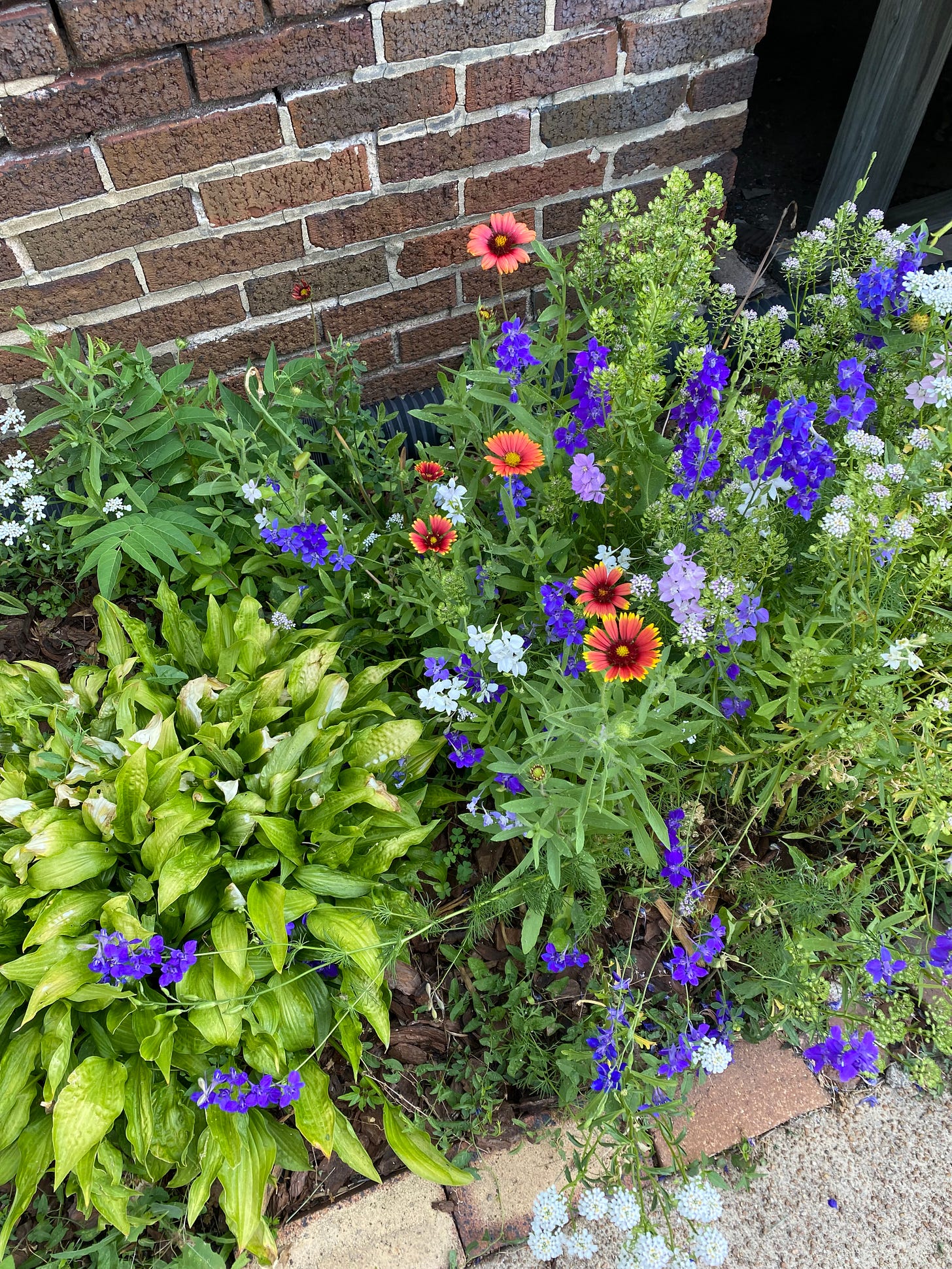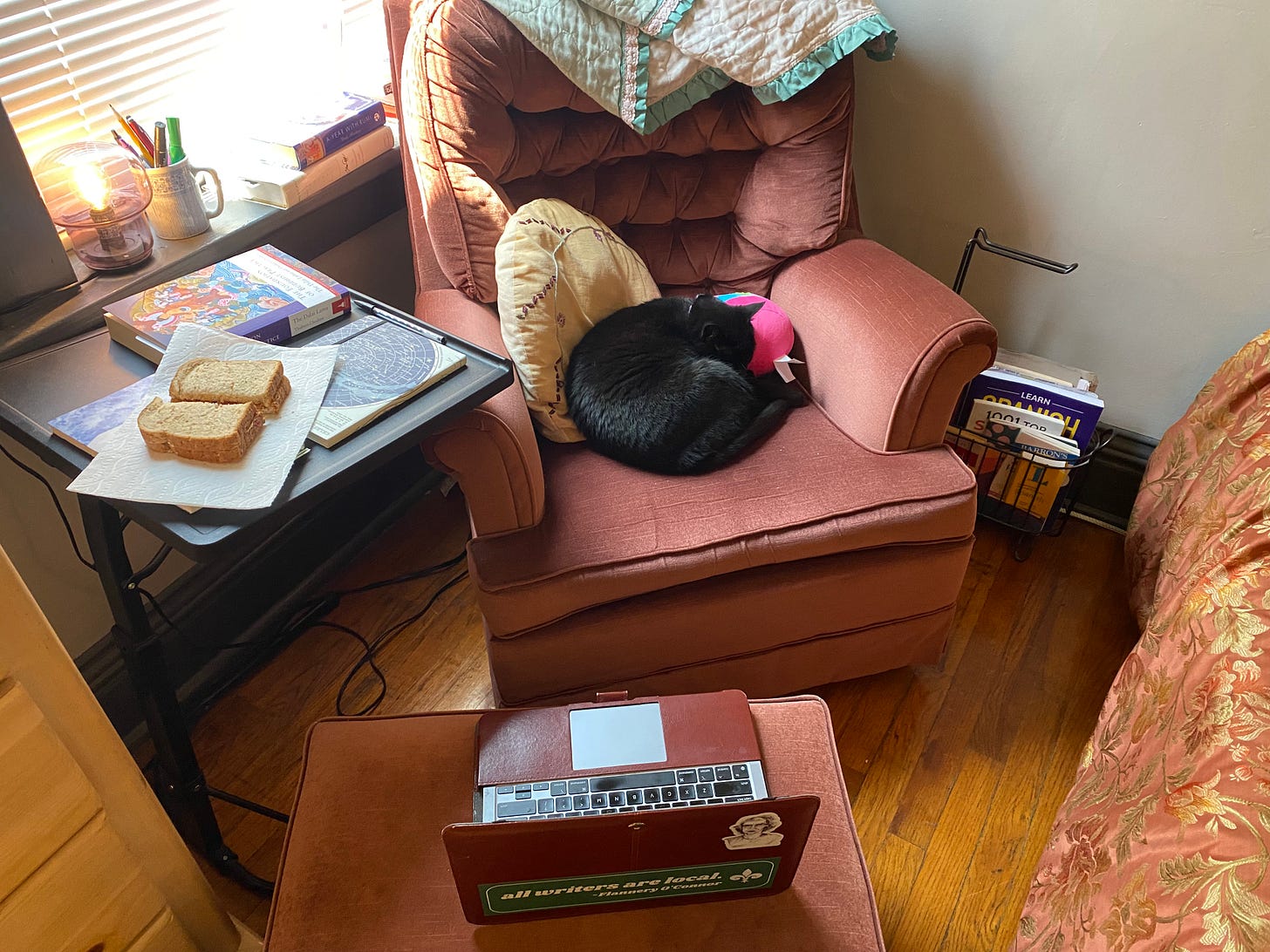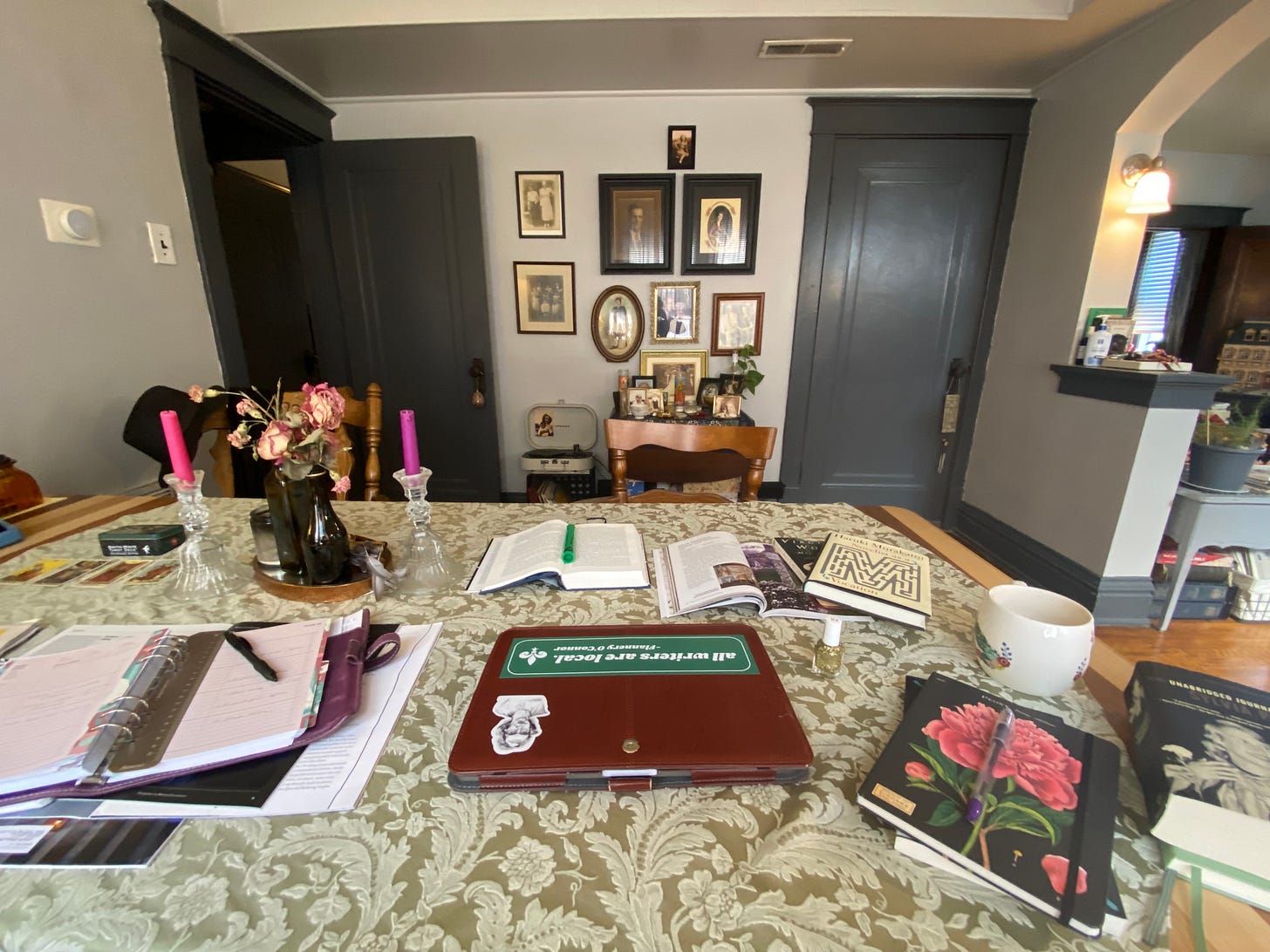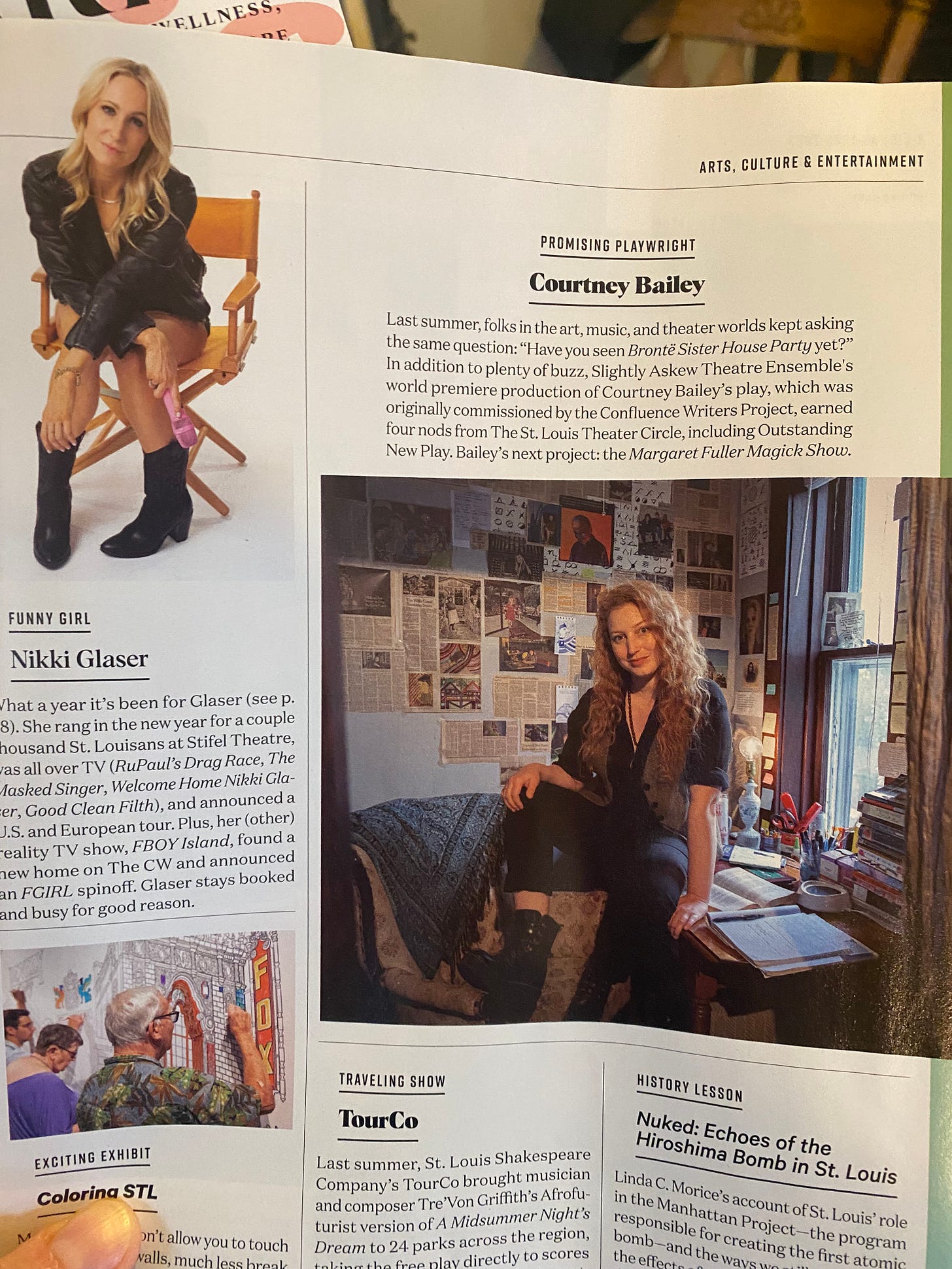Letters from the Homestead: June 2023 ☀️
Making peace with the heat, writing about real people, and feeling "promising"...
Emily Dickinson called her Amherst home “The Homestead.” I lovingly call my apartment in St. Louis the same thing (although I definitely get out more than Dickinson). This monthly newsletter is my attempt to work through what it feels like to put down roots as a writer in my own Homestead.
How is it that I, a born and raised Southerner, never acclimated to “heat”?
I like to imagine that those raised in the American South will be the ones who adapt most easily to climate change. We’ve seen heat. We know it intimately. And we understand how to cope with it—not just practically, but also through our literature (gothic), our moods (gossipy), and our history (grim).
In theory, Southerners understand that “heat” is not the worst of things. It is a thing to be reckoned with but not something worth fighting.
I believe in the thematic significance of “heat.” I believe that it can define a region, strengthen a body (or, sometimes, kill it), and grow really good tomatoes. I believe that it’s character-building to live under global warming conditions that require creativity. The adaptations we learn now could sustain us in the future. I believe all of these things.
But oh my gaaaawwwwdddddd, I hate this heat. My body is just…rejecting it.
I’m miserable, dying, melodramatic. My hair is slicked down to my head with old sweat. Has it always been this hot in the summer? No, it literally has not. This will be the coolest summer of my life and I better deal with it.
I am trying to deal with it. Here is how I’m dealing with it:
Taking care of my pollinator garden. This spring, I planted a slew of native wildflowers, hoping to create a diverse and colorful pollinator garden. It has not disappointed! And it loves the heat. I have to get outside every day and take care of her—watering, weeding, and generally admiring.
“The Cool Corner.” Staying cool in a second floor apartment in 90+ degree temperatures means that it helps to have a “cool corner” as a place to take refuge. My AC unit is very loud (it’s housed in the linen closet), and I find myself hiding from the static sound throughout the day. So, I’ve established a little corner in my bedroom as a quiet, cool space for reading and working. It’s made all the difference.
Being an “indoor cat” when I need to be. I am not an outdoor cat. I would’ve survive on these streets. I am embracing this and staying indoors.
Literally not turning on the stove for the rest of the summer. Just, no. Immediately no.
I hope you are staying safe in all this heat…
Writing About Real People
For Prison Performing Arts, I facilitate Threshold Writers’ Workshop, which meets weekly on Zoom. This means that I’m back on a “lesson planning” schedule where I’m putting together prompts and craft notes on a weekly basis. A few weeks ago, I led a session on “writing about real people.”
This is probably one of my favorite lessons I’ve put together for this workshop, and I thought I’d share some of it here.
There comes a point for every writer where they find themselves using real people as their subject matter. More often than not, those very real people are friends, former friends, family members, or other people who once existed in our social circle.
How do you write about a real person? And how do you do so in a way that is 1) respectful of their humanity and 2) truthfully in service of the art you hope to make?
These are my personal rules for writing about real people. They are totally subjective and a little underdeveloped/superficial. *Shrugs.* Feel free to strongly disagree.
Rule # 1 for writing about real people: We do not write to settle scores.
Rule # 2: Obfuscation is a tool, but it is not a free pass to do whatever you like. (Save that for fiction.)
Rule # 3: Check your intentions every step of the way.
Rule # 4: Writing about others (and your relationship to them) can be a means of healing and expressing your artistry; however, be tender with yourself when approaching traumatic or troubling relationships. Writing is meant to be a source of meaning, delight, and extending the self– there is no requirement to relive trauma in order to be a “real writer.”
Rule # 5: Consider the difference between writing for YOU and writing that’s meant to be shared.
Rule # 6: All people contain both good, bad, and a little bit of the stuff in the middle.
Rule # 7: Consider if you need to ask for permission.
Rule # 8: If you’re writing about a historical figure, be mindful of historical context.
Rule # 9: Cite the real words. Check your sources, if possible.
Here is a prompt we played with during this workshop session.
It’s made by me, but inspired by the “mad-lib” prompts popularized by Joseph Fasano on Twitter. This is a great way to use a prompt to help you look for key images, freeing you up to focus on the operative words instead of the noise.
When I saw you again at/in the (name of a place),
carrying your (noun) full of (verbing nouns),
I wondered if (nouns) care about (adjective + noun).
You looked like you did in the season of (noun or verb),
like (a person or animal, named or unnamed), (verbing) in (new place).
Who are you now? (Adjective)?
This is the place where (nouns verb).
This is the place where I am (adjective or verb).
You left your (noun from line 2) with me.
I will hold it here until the season of (noun or verb from line 4).
Here is how I would complete this prompt:
When I saw you again in the sanctuary,
carrying your suitcase full of crumbling bibles,
I wondered if ghosts care about lost socks.
You looked like you did in the season of forgetfulness,
like a Texas bull, dancing in a boardroom.
Who are you now? Successful?
This is the place where prayer cards rip.
This is the place where I am softening.
You left your suitcase with me.
I will hold it here until the season of forgetfulness.
A few scenes from the month, scrapbook style…

What I’m Reading This Month
From Where You Dream: The Process of Writing Fiction by Robert Olen Butler. This is exactly the book I needed to inspire me this summer. It’s a little “woo, woo,” but sometimes that’s what you need. I’ve been plugging this book to my writing workshop participants on a weekly basis.
The Foundations of Buddhist Practice by The Dalai Lama and Thubten Chodron. This is the most comprehensive introduction to Buddhism I’ve found. I love the straightforwardness of His Holiness the Dalai Lama’s style—simple and thorough.
The Long Loneliness: The Autobiography of Dorothy Day by Dorothy Day. I pick up this book once a year. This time, I’ve been listening to it in audiobook form before I fall asleep each night. I identify with her restlessness. (Also, this is a really good band name: The Long Loneliness.)
How I made money this month $$$
I believe freelance artists should be more upfront about how they support themselves financially, rather than maintaining the illusion that they are fully supported by their art (they usually aren’t). This is me attempting to live out that principle. So, here are all the ways I brought in money to the Homestead for the month of June.
Teaching artist work for Prison Performing Arts. Teaching a weekly writing workshop and gearing up to teach Spoken Word in some new facilities.
Compiling/editing an anthology for PPA. It’s been fun to put on my editorial hat and collect/arrange short pieces for a printed anthology.
Facilitating online graduate literature courses. Every day I’m grading, grading, grading.
Grant money! Thanks to a generous artistic research grant from the Folger Shakespeare Library, I can really get to work on my play about Charlotte Cushman, which will eventually have a home with the women’s prison in Vandalia, MO.
Playwriting stipend for The Brechtfast Club. Hooray for being a working playwright!
Paid Substack subscriptions! Thank you to all of my paid subscribers. It means the world to me that you make a financial contribution to my work.
May your July be “promising.”
St. Louis Magazine says I’m “promising.” She’s a promising young playwright, sitting quaintly in front of her Beautiful Mind conspiracy board. 😂 Please put “promising” on my tombstone.
Tonight starts a new month. It’s already promising.
Yours ever,
Courtney, Mistress of the Homestead, and Noble Midge the Cat 🐈⬛ (& Sir Linus and Lady Jessica, my parents’ cats that I’m cat-sitting 🐈 🐈 )













